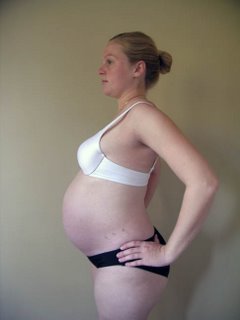Last week I visited a hospital with a friend who is 7 months pregnant. She had an okay birth with an OB a few years ago, but during this pregnancy has realized that she wants—and deserves—so much more. I’ve been providing her with information about all of her options, from unassisted birth to hospital birth with a CNM. I loaned her two of my favorite books,
Ina May’s Guide to Childbirth and
The Thinking Woman’s Guide to a Better Birth, and several birth DVDs. She is most interested in homebirth but, like me, has had trouble finding an available midwife. So we took a trip to visit this hospital’s maternity wing and to chat with a CNM who comes highly recommended.
This hospital is one of two certified
Baby Friendly facilities in the entire state, and its cesarean rate is half the national average. One of the on-call OB’s has a cesarean rate of 10%. (The other OB’s rates are around the national average of 30%.) If I had to go to a hospital, this is the one I would choose.
Still, what I saw was so disappointing. Not because I was expecting anything better—I am familiar enough with hospital birth rooms and routines—but because a hospital could easily offer an entirely different birth experience if they truly understood the physiology of birth. Michel Odent’s book
Birth Reborn gives us a glimpse into what a hospital birth experience should be like, if a laboring women’s needs for privacy, security, warmth, darkness, and lack of feeling observed were truly understood and respected.
At this hospital was the standard high, narrow birth bed with stirrups and foot rests. Because women *still* give birth on their backs even though we know it’s a terrible position. There was the high-intensity spot light built into the ceiling so your perineum gets center stage (because of course you will be in bed on your back for the birth). Electronic fetal monitor—check. Never mind that every study done on fetal monitors has shown that they do NOT improve fetal outcomes at all. Their only documented effect is to dramatically raise the cesarean rate. Uncomfortable couch for the father—check. Lots of other medical equipment half-heartedly hidden by pastel wallpaper—check.
I asked the nurses what the standard admittance routine was: electronic fetal monitor strip, blood pressure, temperature, and IV. The nurses have NEVER seen a woman labor at this hospital without an IV or heplock. Never.
On the upside, they do have gigantic Jacuzzi tubs for laboring. I’d say they are even bigger than mine. They are actually so big and high that I don’t know how a pregnant woman would actually be able to climb in...
Like I mentioned, the hospital is Baby Friendly certified, which means it meets these 10 requirements as outlined by the WHO-UNICEF:
• Have a written breastfeeding policy that is routinely communicated to all health care staff;
• Train all health care staff in skills necessary to implement this policy;
• Inform all pregnant women about the benefits and management of breastfeeding;
• Help mothers initiate breastfeeding within a half-hour of birth;
• Show mothers how to breast feed and how to maintain lactation even if they should be separated from their infants;
• Give newborn infants no food or drink other than breast milk unless medically indicated;
• Practice rooming in: allow mothers and infants to remain together 24 hours a day;
• Encourage breastfeeding on demand;
• Give no artificial teat or pacifiers (also called dummies or soothers) to breastfeeding infants;
• Foster the establishment of breastfeeding support groups and refer mothers to them on discharge from hospitals or clinics.
The sad thing is that only two hospitals in the entire state meet these fairly minimal requirements. Every hospital should automatically do these things!
Even more dismal is the tiny number of hospitals nationwide that meet the
Mother-Friendly Childbirth Initiative, as outlined by the Coalition for Improving Maternity Services. Here are the basic requirements to be certified as Mother-Friendly:
1. Offers all birthing mothers: unrestricted access to the birth companions of her choice, including fathers, partners, children, family members, and friends; unrestricted access to continuous emotional and physical support from a skilled woman-for example, a doula or labor-support professional; access to professional midwifery care.
2. Provides accurate descriptive and statistical information to the public about its practices and procedures for birth care, including measures of interventions and outcomes.
3. Provides culturally competent care -- that is, care that is sensitive and responsive to the specific beliefs, values, and customs of the mother's ethnicity and religion.
4. Provides the birthing woman with the freedom to walk, move about, and assume the positions of her choice during labor and birth (unless restriction is specifically required to correct a complication), and discourages the use of the lithotomy (flat on back with legs elevated) position.
5. Has clearly defined policies and procedures for collaborating and consulting throughout the perinatal period with other maternity services, including communicating with the original caregiver when transfer from one birth site to another is necessary; linking the mother and baby to appropriate community resources, including prenatal and post-discharge follow-up and breastfeeding support.
6. Does not routinely employ practices and procedures that are unsupported by scientific evidence, including but not limited to the following: shaving, enemas, IVs, withholding nourishment, early rupture of membranes, electronic fetal monitoring.
Other interventions are limited as follows: induction rate of 10% or less; episiotomy rate of 20% or less, with a goal of 5% or less; total cesarean rate of 10% or less in community hospitals, and 15% or less in tertiary care (high-risk) hospitals; VBAC (vaginal birth after cesarean) rate of 60% or more with a goal of 75% or more.
7. Educates staff in non-drug methods of pain relief and does not promote the use of analgesic or anesthetic drugs not specifically required to correct a complication.
8. Encourages all mothers and families, including those with sick or premature newborns or infants with congenital problems, to touch, hold, breastfeed, and care for their babies to the extent compatible with their conditions.
9. Discourages non-religious circumcision of the newborn.
10. Strives to achieve the WHO-UNICEF "Ten Steps of the Baby-Friendly Hospital Initiative" to promote successful breastfeeding.
These elements should be a given in any hospital service! The hospital I visited, which is by far the least interventive in the entire area, fails miserably in at least 4 of the 10 requirements (#2, 4, 6 & 7). This is my best choice??
The final irony is the brochure the nurse gave me at the end of the tour. The front page proclaims in big letters: "Just Right In Every Way."










